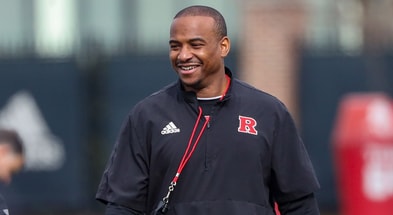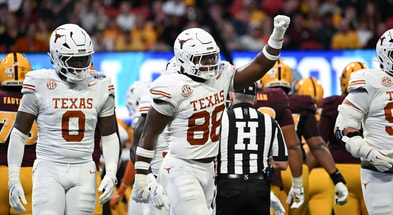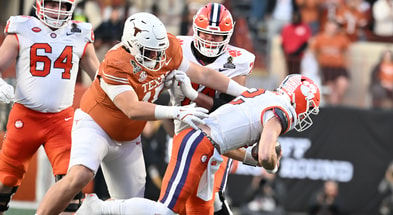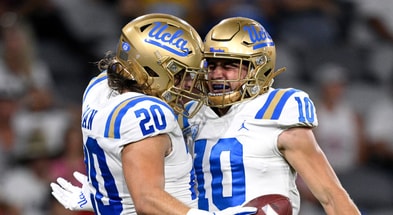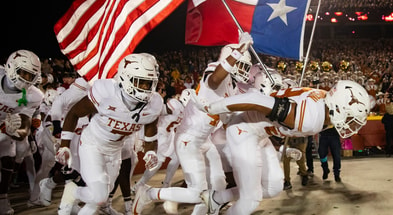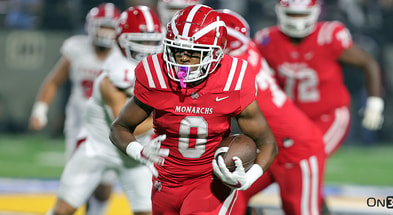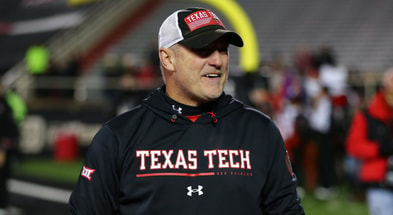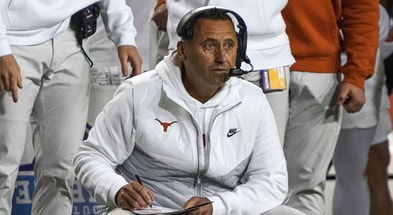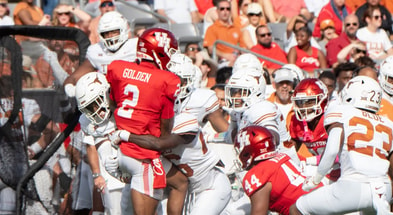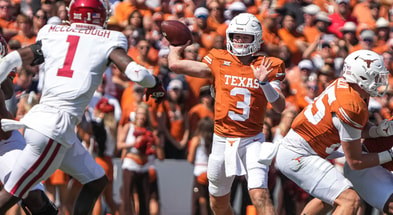[caption id="attachment_22426" align="alignleft" width="300"]

Texas vs TCU. (Will Gallagher/IT)[/caption]
By:
Chris
Hall
What TCU has accomplished is impressive.
In less than two decades the football program has transformed the university. After its Rose Bowl win in 2010, TCU had a 42% increase in enrollment applications. But things haven’t always been that way in Fort Worth.
In 1996, they were a Southwest Conference loser. TCU was on the outside looking in, left out of the new and improved Big 12. They had been banished by the powers that be to college football’s Division 1 wasteland: the WAC.
The Western Athletic Conference was not quite Division I-AA, but not welcome among the "big boys” of college football either. In the late 90s, the WAC was a place for small programs to languish. Only the strong would survive and “graduate” to premiere conferences. Today, TCU and Utah are the only two to escape and be invited into Power 5 conferences.
In 1998, the arrival of Dennis Franchione changed things. He became head football coach at TCU, and perhaps unbeknownst to him when he took the job, he had a future Hall-of-Famer playing running back. The legs of LaDainian Tomlinson would take the Horned Frogs to new heights.
Two bowl wins, three conference championships, and a near undefeated season later, Franchione escaped the WAC by taking the head coaching position at Alabama. TCU would hire Gary Patterson and make a break for Conference USA.
That was a good decision: both Patterson and the conference move. In his 15 years as head coach, TCU has gone to a bowl game every year but two. They’ve had eight bowl wins, six conference championships, and three upward conference moves all within his tenure.
Winning the Rose Bowl over Wisconsin in 2010 put the program back on the national map. They went undefeated for only the second time in school history, and even narrowly missed playing for the national championship against Auburn or Oregon.
By “coming home” to the Big 12, sharing it’s championship in 2014, and dominating Ole Miss like they don’t belong in the Peach Bowl, they've told all of the college football world they’re on the map to stay.
While I’m genuinely happy for TCU’s success, they still cannot be considered an elite program.
A successful program? Yes. An elite program? Definitely not.
There are at least five reasons why TCU is not yet on the level of a Texas or Oklahoma. Even though the Horned Frogs may beat both those teams on the field this year, they still have a long way to go as a program.
#1 Fanbase
The Horned Frogs have a small fanbase. That’s because they’re a small private school without many students. Thus, they don’t have a tremendous amount of graduating alumni every year. Thus, they don’t have as many people wearing purple and white on Saturdays in the fall.
TCU currently has just under 10,000 students enrolled. Not much, but even that number has signifcantly grown from what it used to be in previous years.
Currently, the Horned Frogs have roughly 75,000 living alumni. Meaning: they couldn’t fill Darrell K. Royal Stadium (where the Longhorns play) if every single living alumnus came. Texas has about 50,000 students enrolled currently — just short of how many alumni TCU has left on the earth.
I’m belaboring this point because it matters. A truly elite program needs a substantial fanbase to support it.
TCU doesn’t currently have that. That’s why when they renovated Amon G. Carter Stadium, they made both nicer and smaller at the same time. New and improved facilities, yes, but with lower expectations for how many people will watch them play.
That way the Horned Frogs could consistently sell-out home games. (Baylor took the same approach when buidling McLane Stadium).
#2 Money
Elite programs are rich, and the rich only get richer.
[caption id="attachment_24066" align="alignright" width="300"]

Texas vs TCU. (Will Gallagher/IT)[/caption]
Texas is about to close the largest endorsement deal in the history of college athletics. Nobody sells more t-shirts, hats, and jerseys than the Longhorns. Michigan (another elite program) recently signed a deal with Nike worth $169 million. Expect the Longhorns to be bigger and better — everything is bigger in Texas.
Without even even getting into land grants and oil rights (UT has them), Texas is second only to Harvard in university endowments. TCU is ranked #67 in that category.
It helps when a university has a large fanbase and living alumni population to draw from. The fans buy the apparel, the deep-pocketed alumni write fat checks. (These five reasons build on each other).
#3 Tradition
Not many kids grow up with the dream of one day playing for TCU.
Why? The Horned Frogs don’t have a tradition of winning.
That’s not entirely true because TCU was great in the 1930s. The Horned Frogs won two national championships under head coach Dutch Meyer (1935, 1938) in that decade. They even had a Heisman Trophy winner, Quarterback Davey O’Brien (1938) who is also in the College Football Hall of Fame.
The only problem is how long ago all that transpired.
Unfortunately, there’s not many people from “the greatest generation” still around. They’re not here to tell the stories of TCU’s success amidst the backdrop of the Great Depression.
People want to be a part of something bigger than themselves; they want their personal story to be part of a greater narrative. That’s exactly what happens at elite programs like Texas and Oklahoma.
A century of consistently winning creates family traditions. Cheering for a certain school gets passed on from generation to generation. That team’s success (and sometimes failure) even gets tied to family memories, and shared family experiences.
Every Thanksgiving growing up we watched the Longhorns play the Aggies. My dad would tell stories about meeting Darrell Royal as a recruit, shaking Earl Campbell’s hand, and how inspiring it all was. The atmosphere in the locker room, literally being there with the Longhorns after a win.
Tradition is what made Texas much more than a scholarship to me. I was fulfilling a Hall family dream. I was joining myself to a grand narrative that included so many great coaches and players before me.
Tradition is what made wearing burnt orange an honor.
I don’t think TCU football has inspired young men in that way, yet.
#4 National Championships
The University of Miami (a.k.a. “The U”) is an example of a small private school that made it big in college football. Notre Dame is another one. It is possible.
The formula is simple: win national championships, and win a lot of them.
That’s what makes you an elite program.
Texas has four; three from the 60s and 70s under Darrell Royal, one from the 2000s under Mack Brown (although we should have had more). Oklahoma has eight — that’s hard to compete with.
It’s winning the whole thing that makes your mark as a program. And it’s not like TCU doesn’t have any, they've won two. But again, the 1930s were a long time ago. There’s hardly anyone left to cherish those seasons and triumphs.
To be elite, the Horned Frogs need national championships. One more would help, a few more would set them apart.
#5 Status
It’s been rumored in the past, Patterson would only leave TCU for one job: Texas.
And who would blame him?
Other than angry Horned Frog fans, no one in their right mind would criticize him for taking the UT job if he had the opportunity. The same would have been true if Texas had offered Art Briles at Baylor, instead of Charlie Strong.
Elite programs have status. That’s why coaches and recuits want to go there; that’s why they de-commit and opt out of million dollar contracts if they have the opportunity.
What Patterson has done at TCU is incredible. It’s similar to what Bill Snyder did and is still doing at Kansas State. Two down-and-out programs without hope of national prominence, get great coaches (and great administrations) that make their programs a legitimate contender every other year.
That’s quite an accomplishment. That being said, not many recruits would pick TCU or K-State over a Texas or Oklahoma. It does happen some (infrequently), and that’s why the Horned Frogs and Wildcats have made their living off of “unknown” recruits. The 2- and 3-star, small town stud that others don’t evaluate because of the competition they play against.
TCU has done an excellent job finding and developing talent, as good or better than any program in the country.
But you have to ask the question: why are they forced to do that in the first place?
Elite programs don’t always have to. Usually recruits (and potential coaches) are banging down their door; sitting on the edge of their couch, waiting for that blessed phone call that may never come.
The difference is status. TCU is not there, yet.
But another two decades of winning on the national stage could change things.

 Texas vs TCU. (Will Gallagher/IT)[/caption]
By: Chris Hall
What TCU has accomplished is impressive.
In less than two decades the football program has transformed the university. After its Rose Bowl win in 2010, TCU had a 42% increase in enrollment applications. But things haven’t always been that way in Fort Worth.
In 1996, they were a Southwest Conference loser. TCU was on the outside looking in, left out of the new and improved Big 12. They had been banished by the powers that be to college football’s Division 1 wasteland: the WAC.
The Western Athletic Conference was not quite Division I-AA, but not welcome among the "big boys” of college football either. In the late 90s, the WAC was a place for small programs to languish. Only the strong would survive and “graduate” to premiere conferences. Today, TCU and Utah are the only two to escape and be invited into Power 5 conferences.
In 1998, the arrival of Dennis Franchione changed things. He became head football coach at TCU, and perhaps unbeknownst to him when he took the job, he had a future Hall-of-Famer playing running back. The legs of LaDainian Tomlinson would take the Horned Frogs to new heights.
Two bowl wins, three conference championships, and a near undefeated season later, Franchione escaped the WAC by taking the head coaching position at Alabama. TCU would hire Gary Patterson and make a break for Conference USA.
That was a good decision: both Patterson and the conference move. In his 15 years as head coach, TCU has gone to a bowl game every year but two. They’ve had eight bowl wins, six conference championships, and three upward conference moves all within his tenure.
Winning the Rose Bowl over Wisconsin in 2010 put the program back on the national map. They went undefeated for only the second time in school history, and even narrowly missed playing for the national championship against Auburn or Oregon.
By “coming home” to the Big 12, sharing it’s championship in 2014, and dominating Ole Miss like they don’t belong in the Peach Bowl, they've told all of the college football world they’re on the map to stay.
While I’m genuinely happy for TCU’s success, they still cannot be considered an elite program.
A successful program? Yes. An elite program? Definitely not.
There are at least five reasons why TCU is not yet on the level of a Texas or Oklahoma. Even though the Horned Frogs may beat both those teams on the field this year, they still have a long way to go as a program.
#1 Fanbase
The Horned Frogs have a small fanbase. That’s because they’re a small private school without many students. Thus, they don’t have a tremendous amount of graduating alumni every year. Thus, they don’t have as many people wearing purple and white on Saturdays in the fall.
TCU currently has just under 10,000 students enrolled. Not much, but even that number has signifcantly grown from what it used to be in previous years.
Currently, the Horned Frogs have roughly 75,000 living alumni. Meaning: they couldn’t fill Darrell K. Royal Stadium (where the Longhorns play) if every single living alumnus came. Texas has about 50,000 students enrolled currently — just short of how many alumni TCU has left on the earth.
I’m belaboring this point because it matters. A truly elite program needs a substantial fanbase to support it.
TCU doesn’t currently have that. That’s why when they renovated Amon G. Carter Stadium, they made both nicer and smaller at the same time. New and improved facilities, yes, but with lower expectations for how many people will watch them play.
That way the Horned Frogs could consistently sell-out home games. (Baylor took the same approach when buidling McLane Stadium).
#2 Money
Elite programs are rich, and the rich only get richer.
[caption id="attachment_24066" align="alignright" width="300"]
Texas vs TCU. (Will Gallagher/IT)[/caption]
By: Chris Hall
What TCU has accomplished is impressive.
In less than two decades the football program has transformed the university. After its Rose Bowl win in 2010, TCU had a 42% increase in enrollment applications. But things haven’t always been that way in Fort Worth.
In 1996, they were a Southwest Conference loser. TCU was on the outside looking in, left out of the new and improved Big 12. They had been banished by the powers that be to college football’s Division 1 wasteland: the WAC.
The Western Athletic Conference was not quite Division I-AA, but not welcome among the "big boys” of college football either. In the late 90s, the WAC was a place for small programs to languish. Only the strong would survive and “graduate” to premiere conferences. Today, TCU and Utah are the only two to escape and be invited into Power 5 conferences.
In 1998, the arrival of Dennis Franchione changed things. He became head football coach at TCU, and perhaps unbeknownst to him when he took the job, he had a future Hall-of-Famer playing running back. The legs of LaDainian Tomlinson would take the Horned Frogs to new heights.
Two bowl wins, three conference championships, and a near undefeated season later, Franchione escaped the WAC by taking the head coaching position at Alabama. TCU would hire Gary Patterson and make a break for Conference USA.
That was a good decision: both Patterson and the conference move. In his 15 years as head coach, TCU has gone to a bowl game every year but two. They’ve had eight bowl wins, six conference championships, and three upward conference moves all within his tenure.
Winning the Rose Bowl over Wisconsin in 2010 put the program back on the national map. They went undefeated for only the second time in school history, and even narrowly missed playing for the national championship against Auburn or Oregon.
By “coming home” to the Big 12, sharing it’s championship in 2014, and dominating Ole Miss like they don’t belong in the Peach Bowl, they've told all of the college football world they’re on the map to stay.
While I’m genuinely happy for TCU’s success, they still cannot be considered an elite program.
A successful program? Yes. An elite program? Definitely not.
There are at least five reasons why TCU is not yet on the level of a Texas or Oklahoma. Even though the Horned Frogs may beat both those teams on the field this year, they still have a long way to go as a program.
#1 Fanbase
The Horned Frogs have a small fanbase. That’s because they’re a small private school without many students. Thus, they don’t have a tremendous amount of graduating alumni every year. Thus, they don’t have as many people wearing purple and white on Saturdays in the fall.
TCU currently has just under 10,000 students enrolled. Not much, but even that number has signifcantly grown from what it used to be in previous years.
Currently, the Horned Frogs have roughly 75,000 living alumni. Meaning: they couldn’t fill Darrell K. Royal Stadium (where the Longhorns play) if every single living alumnus came. Texas has about 50,000 students enrolled currently — just short of how many alumni TCU has left on the earth.
I’m belaboring this point because it matters. A truly elite program needs a substantial fanbase to support it.
TCU doesn’t currently have that. That’s why when they renovated Amon G. Carter Stadium, they made both nicer and smaller at the same time. New and improved facilities, yes, but with lower expectations for how many people will watch them play.
That way the Horned Frogs could consistently sell-out home games. (Baylor took the same approach when buidling McLane Stadium).
#2 Money
Elite programs are rich, and the rich only get richer.
[caption id="attachment_24066" align="alignright" width="300"] Texas vs TCU. (Will Gallagher/IT)[/caption]
Texas is about to close the largest endorsement deal in the history of college athletics. Nobody sells more t-shirts, hats, and jerseys than the Longhorns. Michigan (another elite program) recently signed a deal with Nike worth $169 million. Expect the Longhorns to be bigger and better — everything is bigger in Texas.
Without even even getting into land grants and oil rights (UT has them), Texas is second only to Harvard in university endowments. TCU is ranked #67 in that category.
It helps when a university has a large fanbase and living alumni population to draw from. The fans buy the apparel, the deep-pocketed alumni write fat checks. (These five reasons build on each other).
#3 Tradition
Not many kids grow up with the dream of one day playing for TCU.
Why? The Horned Frogs don’t have a tradition of winning.
That’s not entirely true because TCU was great in the 1930s. The Horned Frogs won two national championships under head coach Dutch Meyer (1935, 1938) in that decade. They even had a Heisman Trophy winner, Quarterback Davey O’Brien (1938) who is also in the College Football Hall of Fame.
The only problem is how long ago all that transpired.
Unfortunately, there’s not many people from “the greatest generation” still around. They’re not here to tell the stories of TCU’s success amidst the backdrop of the Great Depression.
People want to be a part of something bigger than themselves; they want their personal story to be part of a greater narrative. That’s exactly what happens at elite programs like Texas and Oklahoma.
A century of consistently winning creates family traditions. Cheering for a certain school gets passed on from generation to generation. That team’s success (and sometimes failure) even gets tied to family memories, and shared family experiences.
Every Thanksgiving growing up we watched the Longhorns play the Aggies. My dad would tell stories about meeting Darrell Royal as a recruit, shaking Earl Campbell’s hand, and how inspiring it all was. The atmosphere in the locker room, literally being there with the Longhorns after a win.
Tradition is what made Texas much more than a scholarship to me. I was fulfilling a Hall family dream. I was joining myself to a grand narrative that included so many great coaches and players before me.
Tradition is what made wearing burnt orange an honor.
I don’t think TCU football has inspired young men in that way, yet.
#4 National Championships
The University of Miami (a.k.a. “The U”) is an example of a small private school that made it big in college football. Notre Dame is another one. It is possible.
The formula is simple: win national championships, and win a lot of them.
That’s what makes you an elite program.
Texas has four; three from the 60s and 70s under Darrell Royal, one from the 2000s under Mack Brown (although we should have had more). Oklahoma has eight — that’s hard to compete with.
It’s winning the whole thing that makes your mark as a program. And it’s not like TCU doesn’t have any, they've won two. But again, the 1930s were a long time ago. There’s hardly anyone left to cherish those seasons and triumphs.
To be elite, the Horned Frogs need national championships. One more would help, a few more would set them apart.
#5 Status
It’s been rumored in the past, Patterson would only leave TCU for one job: Texas.
And who would blame him?
Other than angry Horned Frog fans, no one in their right mind would criticize him for taking the UT job if he had the opportunity. The same would have been true if Texas had offered Art Briles at Baylor, instead of Charlie Strong.
Elite programs have status. That’s why coaches and recuits want to go there; that’s why they de-commit and opt out of million dollar contracts if they have the opportunity.
What Patterson has done at TCU is incredible. It’s similar to what Bill Snyder did and is still doing at Kansas State. Two down-and-out programs without hope of national prominence, get great coaches (and great administrations) that make their programs a legitimate contender every other year.
That’s quite an accomplishment. That being said, not many recruits would pick TCU or K-State over a Texas or Oklahoma. It does happen some (infrequently), and that’s why the Horned Frogs and Wildcats have made their living off of “unknown” recruits. The 2- and 3-star, small town stud that others don’t evaluate because of the competition they play against.
TCU has done an excellent job finding and developing talent, as good or better than any program in the country.
But you have to ask the question: why are they forced to do that in the first place?
Elite programs don’t always have to. Usually recruits (and potential coaches) are banging down their door; sitting on the edge of their couch, waiting for that blessed phone call that may never come.
The difference is status. TCU is not there, yet.
But another two decades of winning on the national stage could change things.
Texas vs TCU. (Will Gallagher/IT)[/caption]
Texas is about to close the largest endorsement deal in the history of college athletics. Nobody sells more t-shirts, hats, and jerseys than the Longhorns. Michigan (another elite program) recently signed a deal with Nike worth $169 million. Expect the Longhorns to be bigger and better — everything is bigger in Texas.
Without even even getting into land grants and oil rights (UT has them), Texas is second only to Harvard in university endowments. TCU is ranked #67 in that category.
It helps when a university has a large fanbase and living alumni population to draw from. The fans buy the apparel, the deep-pocketed alumni write fat checks. (These five reasons build on each other).
#3 Tradition
Not many kids grow up with the dream of one day playing for TCU.
Why? The Horned Frogs don’t have a tradition of winning.
That’s not entirely true because TCU was great in the 1930s. The Horned Frogs won two national championships under head coach Dutch Meyer (1935, 1938) in that decade. They even had a Heisman Trophy winner, Quarterback Davey O’Brien (1938) who is also in the College Football Hall of Fame.
The only problem is how long ago all that transpired.
Unfortunately, there’s not many people from “the greatest generation” still around. They’re not here to tell the stories of TCU’s success amidst the backdrop of the Great Depression.
People want to be a part of something bigger than themselves; they want their personal story to be part of a greater narrative. That’s exactly what happens at elite programs like Texas and Oklahoma.
A century of consistently winning creates family traditions. Cheering for a certain school gets passed on from generation to generation. That team’s success (and sometimes failure) even gets tied to family memories, and shared family experiences.
Every Thanksgiving growing up we watched the Longhorns play the Aggies. My dad would tell stories about meeting Darrell Royal as a recruit, shaking Earl Campbell’s hand, and how inspiring it all was. The atmosphere in the locker room, literally being there with the Longhorns after a win.
Tradition is what made Texas much more than a scholarship to me. I was fulfilling a Hall family dream. I was joining myself to a grand narrative that included so many great coaches and players before me.
Tradition is what made wearing burnt orange an honor.
I don’t think TCU football has inspired young men in that way, yet.
#4 National Championships
The University of Miami (a.k.a. “The U”) is an example of a small private school that made it big in college football. Notre Dame is another one. It is possible.
The formula is simple: win national championships, and win a lot of them.
That’s what makes you an elite program.
Texas has four; three from the 60s and 70s under Darrell Royal, one from the 2000s under Mack Brown (although we should have had more). Oklahoma has eight — that’s hard to compete with.
It’s winning the whole thing that makes your mark as a program. And it’s not like TCU doesn’t have any, they've won two. But again, the 1930s were a long time ago. There’s hardly anyone left to cherish those seasons and triumphs.
To be elite, the Horned Frogs need national championships. One more would help, a few more would set them apart.
#5 Status
It’s been rumored in the past, Patterson would only leave TCU for one job: Texas.
And who would blame him?
Other than angry Horned Frog fans, no one in their right mind would criticize him for taking the UT job if he had the opportunity. The same would have been true if Texas had offered Art Briles at Baylor, instead of Charlie Strong.
Elite programs have status. That’s why coaches and recuits want to go there; that’s why they de-commit and opt out of million dollar contracts if they have the opportunity.
What Patterson has done at TCU is incredible. It’s similar to what Bill Snyder did and is still doing at Kansas State. Two down-and-out programs without hope of national prominence, get great coaches (and great administrations) that make their programs a legitimate contender every other year.
That’s quite an accomplishment. That being said, not many recruits would pick TCU or K-State over a Texas or Oklahoma. It does happen some (infrequently), and that’s why the Horned Frogs and Wildcats have made their living off of “unknown” recruits. The 2- and 3-star, small town stud that others don’t evaluate because of the competition they play against.
TCU has done an excellent job finding and developing talent, as good or better than any program in the country.
But you have to ask the question: why are they forced to do that in the first place?
Elite programs don’t always have to. Usually recruits (and potential coaches) are banging down their door; sitting on the edge of their couch, waiting for that blessed phone call that may never come.
The difference is status. TCU is not there, yet.
But another two decades of winning on the national stage could change things.




